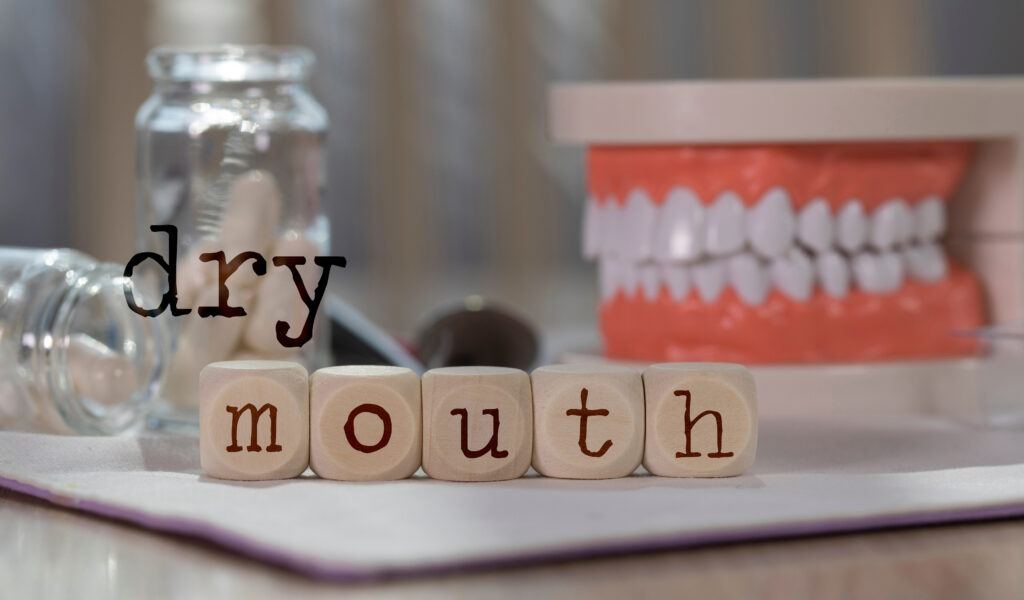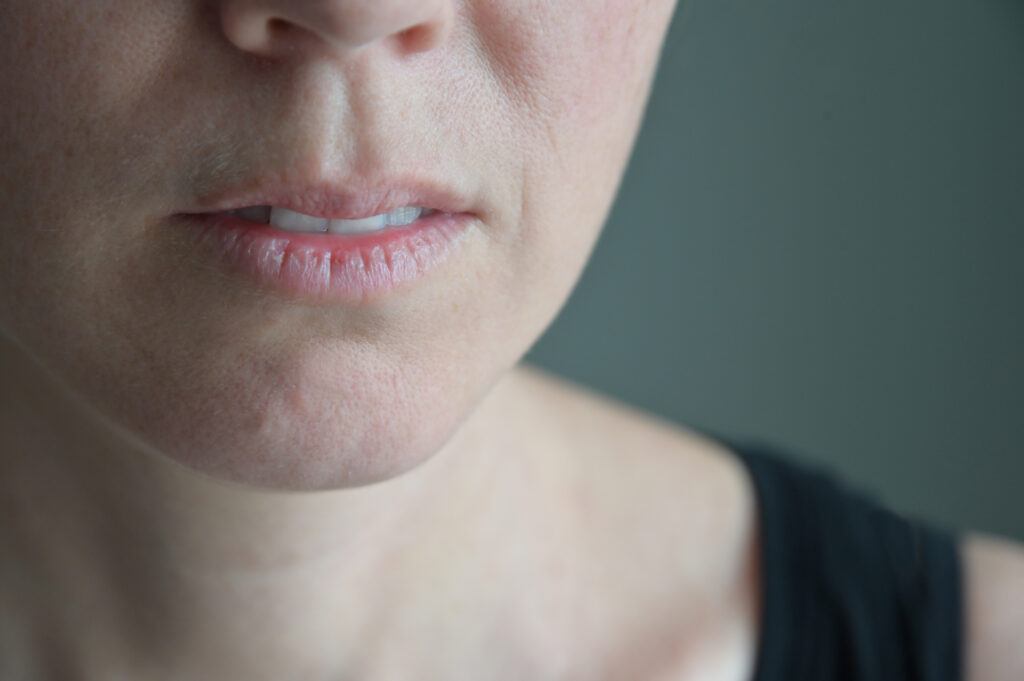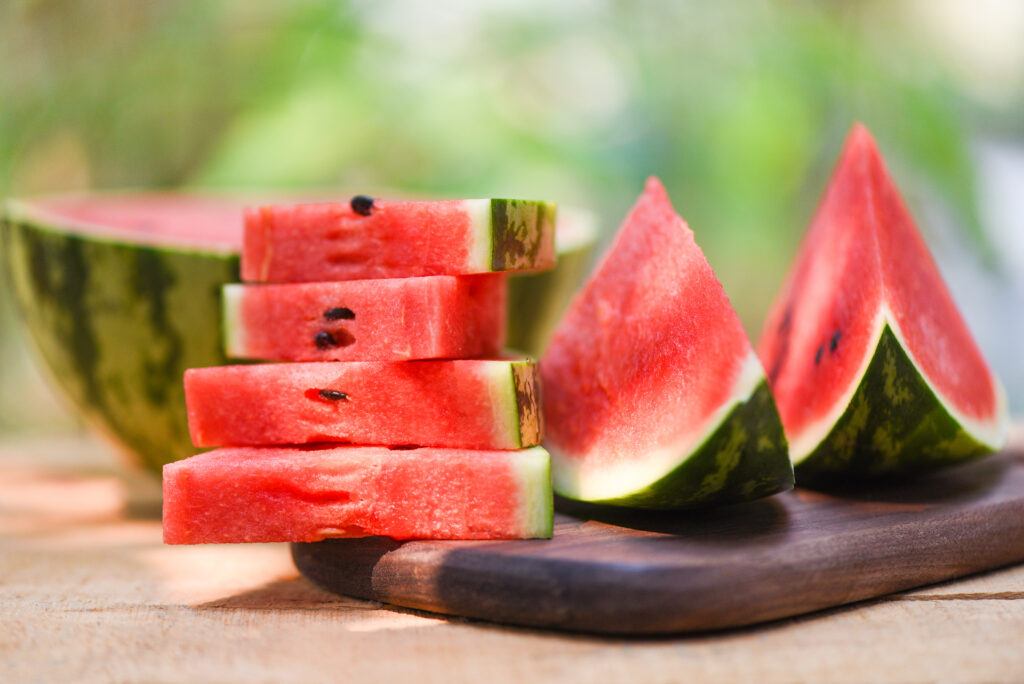Are you tired of dealing with the discomfort of a dry mouth? Luckily, several home remedies can help you find relief.
Hi Again folks!
In this article, we will guide you through various natural remedies and lifestyle changes that can alleviate the symptoms.
One simple solution is using sugarless gum, candy, or lozenges with hydrating agents. Increasing your water intake and using a moisturizing, alcohol-free mouthwash can also keep your mouth hydrated.
Breathing through your nose instead of your mouth can reduce dryness as well. By making some simple yet effective changes and addressing the underlying causes, such as medications or certain habits, you can find long-lasting relief and prevent future episodes.

What Are The Most Common Causes Of This Condition?
The most frequent cause of dry mouth is medication use. Hundreds of common prescription and over-the-counter drugs can reduce saliva flow as a side effect. Some of the most likely types to cause problems include antidepressants, antihistamines, decongestants, diuretics, and pain medications. Letting your doctor know about may just be all you need to effect changes in the dosage or their recommendation of alternate therapies.
After medication use, aging is a leading contributor. As individuals get older, salivary glands may secrete less saliva just as a consequence of aging body changes. Drinking lots of water and using saliva substitutes can help offset decreased saliva. Doctors may also check for conditions more common later in life that affect glands.
Various diseases can be complicit…. for example…Sjögren’s syndrome, Diabetes, Strokes, Yeast infections (like oral thrush), and Autoimmune disorders are some illnesses capable of impairing saliva output. Diagnosing and managing the underlying ailment may improve things. Applying medication recommended by a specialist to the mouth may also provide relief.
Treatments like radiation or chemotherapy for head and neck cancers directly impact salivary gland function. The glands can become inflamed or damaged. However, in many cases, saliva production will at least partially return to normal within the first few months after finishing these treatments.
Lastly, unhealthy lifestyle choices easily create dry mouth problems. Tobacco use, drinking excessive alcohol, and breathing through the mouth while sleeping (often caused by nasal congestion or sleep apnea) can all lower saliva levels over time. Limiting these behaviors and speaking with a doctor can uncover additional ways to prevent dry mouth.
Understanding why dry mouth happens makes it easier to find appropriate next steps for lasting relief.
How Does Xerostomia Affect Your Teeth?
When saliva production is reduced, the protective effects of saliva are lost, leaving teeth vulnerable to tooth decay and infection.
Without adequate saliva flow, teeth are more susceptible to cavities and gum disease. Saliva helps neutralize damaging acids in the mouth and rinse away food particles. It also contains minerals that strengthen tooth enamel. A decrease in saliva allows plaque and bacteria to build up faster, which can erode tooth enamel and irritate gums. Symptoms of dry mouth like a sticky, dry feeling and bad breath can make chewing and swallowing difficult as well.
In the long run, persistent dry mouth can lead to permanent damage to teeth and gums if preventive steps are not taken. To minimize dry mouth complications, it is important to stay hydrated, use sugar-free gum or lozenges to stimulate saliva flow, avoid alcohol and caffeine, and have regular dental checkups. Maintaining good oral hygiene practices is also vital for reducing the plaque and bacteria that can thrive in a dry mouth environment. Letting your dentist know about dry mouth issues right away can help prevent extensive dental work down the road.

Natural Remedies For Dry Mouth
To naturally alleviate dry mouth symptoms, you can try using sugarless gum, candy, or lozenges with hydrating agents. These products stimulate saliva flow and help keep your mouth moisturized throughout the day.
Another natural remedy for dry mouth is aloe vera juice. Aloe vera has hydrating properties that can provide relief and soothe the discomfort caused by dry mouth.
Additionally, marshmallow root is a herb known for its ability to increase saliva production. You can brew marshmallow root tea and drink it to help alleviate dry mouth symptoms.
It’s also important to opt for sugar-free gum and candies to avoid further drying out your mouth.
Lastly, using an alcohol-free mouthwash can help maintain moisture in your mouth without irritating it.
Incorporating these natural remedies into your daily routine can provide you with much-needed relief from dry mouth.
Hydration and Water Intake
How can you ensure proper hydration and water intake to alleviate dry mouth symptoms?
Staying hydrated is crucial for maintaining optimal oral health and relieving the discomfort of dry mouth. Here are three tips to help you stay properly hydrated:
- Drink plenty of water throughout the day. Aim for at least eight glasses of water daily to replenish the fluids in your body and promote saliva production, which helps keep your mouth moist.
- Avoid beverages that can contribute to dehydration, such as caffeine and alcohol. These can worsen dry mouth symptoms, so opt for water or herbal teas instead.
- Keep a water bottle nearby and sip on it regularly. Having easy access to water will remind you to stay hydrated and provide relief for your dry mouth.
By following these tips, you can ensure adequate hydration and water intake, which will help alleviate dry mouth symptoms.
Now, let’s move on to discussing the benefits of using sugarless candies and gum.
Sugarless Candies and Gum
For individuals experiencing dry mouth, incorporating sugarless candies and gum into your routine can provide relief and stimulate saliva production. Chewing sugarless gum with xylitol can help alleviate dry mouth symptoms by increasing saliva flow. Saliva acts as a natural lubricant and helps wash away bacteria in the mouth, reducing the risk of tooth decay and gum disease.
Additionally, sucking on sugarless lozenges containing slippery elm and marshmallow root can coat and moisturize the mouth, providing soothing relief. These herbs contain mucilage, which helps retain moisture in the mouth. It’s important to avoid sugar-containing gum and candies, as they can worsen dry mouth symptoms. Instead, opt for sugarless options that are specifically designed to alleviate dry mouth.
Incorporating sugarless candies and gum into your daily routine can be a simple and effective way to treat dry mouth and provide much-needed relief.
Saliva Substitute Home Remedies For Xerostomia
While there are medications to serve this purpose, there are also some easy home remedies you can try to get relief.
Homemade saliva substitutes are one simple approach. Mix a teaspoon of baking soda and salt into a cup of water. Swish it around your mouth and drink it. The mixture mimics saliva’s pH level to coat, moisturize, and balance your mouth’s environment. You can also try mixing lemon into water or sucking on lemon wedges to stimulate saliva flow. Lemon’s citric acid works with your body’s reflexes to encourage moisture production. Another option is to chew sugar-free gum or suck on sugar-free hard candies as the chewing motion prompts salivary glands into action.
Additionally, staying hydrated supports a healthy salivary flow. Drink frequent sips of cool water throughout your day. You can also incorporate moisture-enhancing foods like yogurt, soup broths, smoothies, popsicles, and ice chips into your snacks and meals. Their liquid content provides relief. Focus on consuming a balanced diet as poor nutrition impacts gland function.
Implementing saliva substitutes and hydration into your routine helps ease xerostomia discomfort until saliva generation improves. Consult your dentist if home remedies are not providing adequate relief.

Frozen Melon or Cucumber
Because the dry sensation in the mouth can be uncomfortable and annoying! Sucking on something cool and wet can provide quick relief. Frozen melon and cucumber are great options that I’d recommend trying.
Melon and cucumber have high water content, which is perfect for hydrating a parched mouth. As they thaw from the frozen state, they release that refreshing liquid. The juicy texture and sweet or mild taste are also quite pleasant and palate-cleansing when your mouth feels dry.
The cold temperature of being frozen provides an extra soothing sensory experience against a scratchy dry mouth.
It’s simple to prepare – just cut up some melon cubes like honeydew or cantaloupe, or slice some cucumber into sticks. Pop them in the freezer until fully frozen, then take one out to suck or chew on as needed whenever you have a dry mouth. The frozen fruit or veggie will cool, lubricate, and hydrate – giving you quick relief. So next time you’re experiencing a cottonmouth or a mouth that feels like the Sahara desert, reach for some frozen melon or cucumber as an easy, tasty way to get moisture flowing again!
Oral Care and Mouthwash
Maintaining good oral care and incorporating mouthwash can help alleviate dry mouth symptoms and promote oral health. Dry mouth, also known as xerostomia, can increase the risk of tooth decay and other oral health issues.
Here are three key points to keep in mind when it comes to oral care and mouthwash for dry mouth:
- Choose a moisturizing mouthwash: Look for alcohol-free mouthwashes that are specifically designed for dry mouth. These products can help hydrate the mouth and provide temporary relief from dryness.
- Rinse your mouth regularly: Rinse your mouth with plain water or a mild saline solution throughout the day. This can help remove food particles and bacteria, reducing the risk of tooth decay and bad breath.
- Consult your dentist: It’s important to consult with your dentist or oral healthcare professional for personalized advice. They can recommend the most suitable mouthwash and guide proper oral care techniques.
Can Oral Sprays or Nasal Wash Come To The Rescue?
Using an oral spray or nasal wash is an easy and effective way to get relief. The main reason these methods work so well is that they lubricate the oral tissues and sinuses, keeping them from getting overly dry.
Oral sprays typically contain ingredients like glycerin, xylitol, and olive oil. These coat the inside of the mouth and throat, providing a layer of protection against irritation. Many oral sprays also have moisturizing properties to hydrate oral tissues. To use, you simply spray the formula directly into your mouth as needed. It quickly gets to work soothing dryness.
Nasal washes work similarly for the sinuses. Using a saline solution, you flush out the nasal passages, removing any dried mucus or irritants. This cleans the area and allows the tissues to rehydrate themselves. It also improves sinus drainage which can contribute to dry mouth. To administer, use a specially designed bottle to irrigate your nasal cavities. This should provide relief for several hours before needing to repeat the process. Just be sure to use distilled or previously boiled water to avoid contamination.
In summary, oral sprays and nasal washes can bring fast-acting and long-lasting lubrication to the mouth and sinus area. The ingredients coat and hydrate tissues while also cleaning out the nasal passages for better function. They are easy to use and can make a big difference in relieving an uncomfortable dry mouth.
Breathing Techniques To Reduce Dry Mouth
To reduce dry mouth symptoms, incorporate breathing techniques such as nasal breathing, which can help increase saliva production and alleviate discomfort. Breathing through your nose can help keep your mouth moist and prevent excessive evaporation of saliva. This technique is especially beneficial during sleep, as it can help reduce dry mouth upon waking up.
Here are some contextually relevant breathing techniques to reduce dry mouth:
| Technique | Steps |
|---|---|
| Nasal Breathing | Breathe in and out through your nose, keeping your mouth closed. This helps to retain moisture in your mouth and throat. |
| Diaphragmatic Breathing | Inhale deeply through your nose, allowing your diaphragm to expand. Exhale slowly through your nose, fully emptying your lungs. This technique can help relax your body and promote saliva production. |
| Alternate Nostril Breathing | Close one nostril with your finger and take a deep breath in through the other nostril. Hold your breath briefly, then exhale through the opposite nostril. Repeat the process, alternating nostrils. This technique can help balance your energy and promote overall well-being. |
| Belly Breathing | Place one hand on your belly and the other on your chest. Take a deep breath in through your nose, allowing your belly to rise. Exhale slowly through your nose, feeling your belly fall. This technique can help reduce stress and promote relaxation. |
| Box Breathing | Inhale deeply through your nose for a count of four. Hold your breath for a count of four. Exhale slowly through your nose for a count of four. Hold your breath again for a count of four. Repeat the process, focusing on the rhythmic pattern. This technique can help calm your mind and improve saliva production. |
Incorporating these breathing techniques into your daily routine can help reduce dry mouth symptoms and improve your overall oral health. Remember to consult with a dental or medical professional for personalized advice and treatment options.
Humidifier For Added Moisture
Increase the moisture in your environment by incorporating a humidifier for added relief from dry mouth symptoms. A humidifier can be a valuable addition to your home remedies for dry mouth, as it helps to increase the moisture in the air, providing much-needed hydration for your mouth and throat.
Here are three reasons why using a humidifier can be beneficial:
- Moisturizes the air: A humidifier adds moisture to the air, helping to combat the dryness that contributes to dry mouth. By increasing the humidity levels in your environment, it can alleviate discomfort and reduce the symptoms of dry mouth.
- Relieves dryness during sleep: Using a humidifier while sleeping can provide continuous moisture throughout the night, preventing your mouth from becoming dry and uncomfortable. This can result in better sleep quality and reduced dry mouth symptoms upon waking up.
- Complements other remedies: Incorporating a humidifier into your daily routine complements other home remedies for dry mouth, such as staying hydrated and avoiding caffeine and alcohol. By using a humidifier, you can enhance the effectiveness of these remedies and experience greater relief from dry mouth discomfort.
Step-by-Step Guide For Using a Humidifier
First, choose a cool mist or warm mist humidifier based on your preferences. Cool mist humidifiers don’t have heating elements, while warm mist models boil water to produce steam. Place the humidifier on a flat surface in your bedroom and fill the tank with distilled or filtered water as directed.
Turn the humidifier on according to the manufacturer’s instructions, usually by setting the humidity level or output settings.
Let it run for a few hours, refilling the tank as needed. Make sure to clean the humidifier regularly to prevent mineral deposits and the growth of mold or bacteria. With consistent use, a humidifier can ease dry mouth and throat discomfort.
As dry air passes over the mouth and throat when breathing, it pulls moisture out – contributing to dryness. A humidifier puts moisture back into the air to prevent this evaporation of natural moisture from the mouth and throat.
Breathing humid air may stimulate more water drinking, helping to produce more saliva and reduce thick mucus. Properly hydrating by drinking more water is key for reducing dry mouth.
Humid air can help loosen nasal congestion and support breathing through the nose instead of the mouth. Mouth breathing worsens dryness.
Using a humidifier can provide gradual relief from dry mouth over hours of consistent use. It’s generally recommended to use a humidifier for dry mouth 2-3 times per day for optimal relief – such as morning, evening, and overnight while sleeping. The humid, moisture-rich air needs consistent contact with the mouth and throat to ease dryness effectively. Monitoring hydration and oral care routine is also important.
Herbal Remedies and Alternative Treatments
If you’re looking for additional relief from dry mouth symptoms, consider exploring herbal remedies and alternative treatments.
Herbal remedies such as ginseng, marshmallow root, and slippery elm have been known to stimulate saliva production and retain moisture in the mouth, helping to relieve dry mouth, also known as xerostomia.
Traditional Chinese medicine suggests that dry mouth may be a result of a fluid deficiency, and herbal remedies like ginseng can help restore balance in the body.
However, it’s important to consult with an integrative medicine provider and inform your doctor about any herbal remedies you plan to use, as they can have potential side effects or interactions with other medications.
Additionally, be cautious of herbs like Yohimbe, guarana, toothache plant, and Sarcandra glabra, as they may have harmful effects.
Remember to communicate any concerns or changes in symptoms to your healthcare professionals and address the underlying condition contributing to dry mouth.
Consider incorporating aloe vera, which has soothing and moisturizing properties, into your dry mouth home remedies.
Frequently Asked Questions
How Do You Treat Dry Mouth Naturally?
You can treat dry mouth naturally by using sugarless gum or lozenges, increasing water intake, and avoiding tobacco and alcohol. Try breathing through your nose instead of your mouth and consider using a humidifier. Consulting professionals can help determine suitable treatments.
What Can I Drink for Extremely Dry Mouth?
You can drink plenty of water and stay hydrated to alleviate dry mouth. Avoid caffeine, alcohol, and tobacco. Make a mouthwash with warm water, baking soda, and salt to mimic saliva. Chew sugarless gum or use lozenges with hydrating agents.
What Vitamin Deficiency Is Dry Mouth?
Dry mouth can be caused by a deficiency in vitamins like B3, B2, and B6. Consult a healthcare provider to determine if a vitamin deficiency is contributing to your dry mouth symptoms.
What Can I Eat to Stop Dry Mouth?
To stop dry mouth, try chewing sugar-free gum, sucking on lozenges with hydrating agents, or holding coconut or sesame oil in your mouth. Avoid sugary and acidic foods. Consider consulting dental or medical professionals for suitable treatments.
Can Using Mouthwash for Gum Disease Help with Dry Mouth?
Using the best mouthwash for gum disease can help with dry mouth. The antibacterial properties in the best mouthwash for gum disease can help improve gum health and fight against the bacteria that can cause dry mouth. Regular use can lead to improved overall oral health.
Conclusion
In conclusion, don’t let dry mouth discomfort get in the way of your daily life. With the help of these natural remedies and lifestyle changes, you can find relief and keep your mouth hydrated.
Remember to stay hydrated, use sugarless gum or candy, and consider using a moisturizing mouthwash. These simple steps can help increase saliva production and alleviate dry mouth symptoms.
Additionally, it’s important to breathe through your nose as much as possible. Breathing through your mouth can contribute to dryness, so try to be mindful of your breathing habits.
If you’re experiencing persistent dry mouth, it’s crucial to address any underlying causes. Dry mouth can be a side effect of certain medications or a symptom of an underlying medical condition. Consulting with a healthcare professional can help you identify and address the root cause of your dry mouth.
Seeking guidance from professionals is also important for long-lasting relief. Dentists and doctors can provide recommendations tailored to your specific needs and help you find the most effective treatment options.
So, don’t let dry mouth hold you back. By implementing these lifestyle changes and seeking professional guidance, you can soothe your dry mouth and embrace a more comfortable future.
